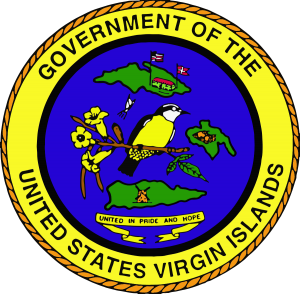During a Cabinet meeting on St. Croix on Tuesday, Governor Kenneth E. Mapp thanked his leadership team and other members of his Administration for working tirelessly with the U.S. Virgin Islands community and federal officials to submit proposals which resulted in the approval of critical funds for the recovery and the long-term sustainable development of the Territory.
Tuesday’s meeting was followed by a news conference on Wednesday, July 11 at Government House – Christiansted in response to Department of Housing and Urban Development (HUD) Secretary Ben Carson’s announcement of the approval of HUD’s Community Development Block Grant — Disaster Recovery (CDBG-DR) Program, which funds $243 million in long-term recovery efforts focused on housing, infrastructure and economic development. The funding was awarded in February, but the HUD Program requires grantees, such as the Government of the Virgin Islands, to submit a thoughtful recovery plan informed by local residents.
“This is a great day for the U.S. Virgin Islands and we must congratulate the hard-working men and women of the Virgin Islands who worked long hours to present proposals, resulting in the approval of HUD funding,” said Governor Mapp. “This marks a major milestone in the Territory’s recovery.”
“The approvals we received today will enable us to move forward quickly on major recovery activities across the Territory, including the dredging of our harbors and channels to spur tourism growth, as well as provide care for our seniors and the most vulnerable in our community,” Governor Mapp reported. “I also want to express my personal thanks to President Donald Trump, HUD Secretary Ben Carson and his team, led by Deputy Secretary Pam Patenaude and Assistant Secretary Neal Rackleff, for their tremendous support of the people of the Virgin Islands.”
“Planning is critical to recovery. Today, we begin the process of putting this plan to work,” said Secretary Carson. “HUD will continue to stand shoulder-to-shoulder with our partners on the ground to help the citizens of the U.S. Virgin Islands to recover and rebuild their homes and their lives.”
To address unmet needs, the U.S. Virgin Islands identified several housing, infrastructure and economic development recovery needs arising from Hurricanes Irma and Maria, including $30 million for rebuilding local roads to federal standards; $45 million for the Water and Power Authority to build new wind and solar power generation systems; $23 million to dredge harbors to accommodate Quantum and Oasis class cruise vessels, plus $5 million for a tourism marketing campaign.
“We have also been approved to invest $5 million for workforce development and training to help our people take advantage of the growing number of jobs becoming available throughout the Territory,” Governor Mapp explained.
In addition, HUD’s funding provides resources for reconstruction of hurricane damaged homes and to build new affordable and public housing.
A total of $15 million has been approved for the first phase of the modernization and expansion of Herbert Grigg Home for the Aged on St. Croix and acquisition and modernization of Sea View Nursing Facilities on St. Thomas, including independent and assisted living homes, expansion of long-term care facilities and construction of major rehabilitation facilities on their campuses.
The following programs have been designed to address the Territory’s unmet needs and assist in the recovery:
- Homeowner Rehabilitation and Reconstruction Program ($10 million) – This program is available to eligible homeowners for properties that were damaged by Hurricane Irma or Maria, or both.
- New Construction for Homeownership Opportunity and First Time Homebuyer Assistance ($10 million) – This program is designed to address post-disaster housing affordability challenges and enable renters to become homeowners.
- Rental Rehabilitation and Reconstruction ($5 million) – This program provides funds for the repair or replacement of damage to rental housing owned by the Virgin Islands Housing Authority, Virgin Islands Housing Finance Authority, or private landlords.
- Public & Affordable Housing Development ($32 million) – These funds are targeted for the redevelopment and creation of new affordable housing, including subsidized and mixed-income rental units.
- Supportive Housing & Sheltering Programs ($15 million) – The U.S. Virgin Islands recovery plan includes an effort for the rehabilitation, reconstruction and development of housing for vulnerable populations, particularly among low-income seniors and individuals and families experiencing homelessness. This program also includes the development of emergency shelters for individuals and families who cannot shelter in place during disasters. The emergency shelter housing would also serve persons who require short-term housing because they are temporarily displaced.
- Infrastructure ($125,549,800) – These funds are targeted for three infrastructure activities: 1) Local Match for Federal Disaster Relief Programs ($50,549,800) to help finance educational facilities, energy, hospitals, telecommunications, transportation, waste management, and water/wastewater management; 2) Infrastructure Repair and Resilience ($30,000,000) and 3) Electrical Power Systems Enhancement and Improvement ($45,000,000).
- Economic Revitalization ($33 million) – Through this program, the U.S. Virgin Islands seeks to revitalize the post-disaster economy, including ($23 million) for Ports and Airports Enhancements, including dredging to allow for larger cruise ships; the Tourism Industry Support Program ($5,000,000) for marketing to communicate that the USVI is open for business; and Workforce Development Program to train low- and moderate-income residents to fill construction and other jobs coming from recovery investments ($5,000,000).
In April, HUD also allocated an additional $1.621 billion of CDBG-DR funding to the U.S. Virgin Islands for unmet needs, infrastructure and mitigation purposes. HUD will shortly issue requirements governing those funds and the U.S. Virgin Islands, along with other territories and states, will be required to submit plans addressing their use.
“The work continues and we have begun our discussions with HUD on a spending plan for the second tranche of approximately $847 million,” the Governor concluded, encouraging his team to implement a robust government recruitment campaign to hire the staff required to take on many of the planned projects.
